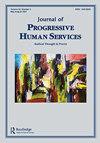Intersectional and Relational Frameworks:Confronting Anti-Blackness, Settler Colonialism, and Neoliberalism in U.S. Social Work
IF 0.8
Q1 SOCIAL WORK
引用次数: 10
Abstract
ABSTRACT Positivist epistemologies have been argued to advance learning and interventions to improve the health of multiply marginalized and colonized people; however, these long-standing approaches have not served social and health equity. An intersectionality health equity lens understands differences in health to be impacted by the social position of multiply marginalized and colonized people embedded in systems of oppression. Bringing forward the sociohistorical contexts of whiteness and respectability in US social work provides necessary insight into how white supremacy can produce and replicate itself through policy and practice. Whiteness and respectability politics reinforce settler colonialism in the US and provide a foundation for neoliberal, sociopolitical economic policy that monitors, controls, and shapes the lives of multiply marginalized and colonized communities. Critical knowledge development engaging intersectionality is needed for US social workers to participate in structural change without perpetuating inequity and dispossession. Eradicating the violence of capitalism for future generations necessitates a radical relational praxis to deepen the sociopolitical economic analysis of economies of health inequity.跨部门和关系框架:美国社会工作中的反黑人、定居者殖民主义和新自由主义
摘要实证主义的认识论被认为是为了促进学习和干预,以改善被边缘化和被殖民的人群的健康;然而,这些长期存在的方法并没有为社会和健康公平服务。交叉性的健康公平视角理解健康差异会受到压迫制度中被多重边缘化和殖民的人的社会地位的影响。在美国社会工作中提出白人和受人尊敬的社会历史背景,为白人至上主义如何通过政策和实践产生和复制自身提供了必要的见解。白人和受人尊敬的政治强化了美国的定居者殖民主义,并为新自由主义、社会政治经济政策提供了基础,该政策监督、控制和塑造了被边缘化和被殖民社区的生活。美国社会工作者需要参与跨部门的关键知识开发,以参与结构变革,而不会使不公平和剥夺权利永久化。为子孙后代消除资本主义的暴力需要一种激进的关系实践,以深化对健康不平等经济的社会政治经济分析。
本文章由计算机程序翻译,如有差异,请以英文原文为准。
求助全文
约1分钟内获得全文
求助全文
来源期刊

Journal of Progressive Human Services
SOCIAL WORK-
CiteScore
3.20
自引率
8.30%
发文量
14
期刊介绍:
The only journal of its kind in the United States, the Journal of Progressive Human Services covers political, social, personal, and professional problems in human services from a progressive perspective. The journal stimulates debate about major social issues and contributes to the development of the analytical tools needed for building a caring society based on equality and justice. The journal"s contributors examine oppressed and vulnerable groups, struggles by workers and clients on the job and in the community, dilemmas of practice in conservative contexts, and strategies for ending racism, sexism, ageism, heterosexism, and discrimination of persons who are disabled and psychologically distressed.
 求助内容:
求助内容: 应助结果提醒方式:
应助结果提醒方式:


